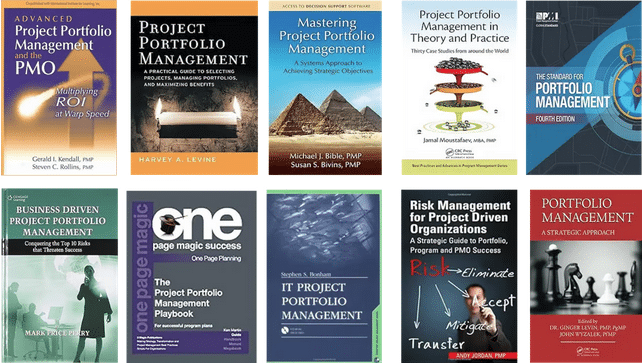
Whether you’re an experienced professional or just stepping into your first project roles, understanding the nuances of portfolio management can open a window of opportunity for you. And propel your career to new heights of greatness.
But let’s start by examining exactly what is Portfolio Management?
At its core, portfolio management is the strategic process of overseeing a collection of projects or programs to achieve specific organizational objectives.
While project management focuses on executing individual projects and program management coordinates related projects, portfolio management takes a higher-level view, ensuring alignment with business goals, resource optimization, and risk management across the entire portfolio.
Read my guide to Portfolio Management and the role of the PMO
For further information here is a recommended reading list, to instantly support development of your learning. And guide you through the core competencies needed for portfolio delivery:

Distinguishing Portfolio Management from Project and Program Management
Project and program management activities may typically operate together and are essentially components of the same project lifecycle.
However, Portfolio Management operates at a different level entirely and for its own distinct purposes.
Below is a summary of each, note; that despite the varying applications, it is possible for all three to be in place within the same organization, or to be organized and operated entirely independently of each other.
Project Management: Concerned with executing specific tasks within a defined scope, budget, and timeline to deliver a unique output or outcome.
Role Specifics:Project managers excel in detailed planning, stakeholder communication, and risk mitigation at the project level.
Program Management: Involves managing a group of related projects to achieve strategic objectives.
Role Specifics: Program managers focus on interdependencies between projects, resource allocation across the program, and benefits realization.
Portfolio Management: Takes a holistic view of an organization’s entire project portfolio.
Role Specifics: Portfolio Managers ensure alignment with strategic objectives, balancing resources, prioritizing investments, and managing risks at the portfolio level.
Key Skills and Expectations
Successful portfolio managers possess a diverse skill set, blending technical expertise with strategic vision and strong leadership abilities.
Key skills include:
1. Strategic Alignment: Understanding the organization’s strategic objectives and ensuring that the portfolio of projects supports these goals.
2. Resource Management: Effectively allocating resources, including budget, personnel, and technology, to optimize portfolio performance.
3. Risk Management: Identifying and mitigating risks across the portfolio, proactively addressing potential obstacles to success.
4. Stakeholder Engagement: Building and maintaining relationships with key stakeholders, including executives, project managers, and team members, to ensure alignment and support for portfolio initiatives.
5. Decision Making: Making informed decisions based on data and analysis, prioritizing projects and allocating resources accordingly.
6. Communication: Communicating effectively across all levels of the organization, conveying complex information in a clear and concise manner.
Developing Your Career in Portfolio Management
For those looking to transition into portfolio management or advance their existing skills, here are some strategies to consider:
1. Gain Experience: Seek opportunities to work on cross-functional projects or serve on steering committees to gain exposure to portfolio management principles.
2. Professional Development: Invest in formal training and certifications in portfolio management, such as the Project Management Institute’s PfMP (Portfolio Management Professional) certification.
3. Expand Your Skill Set: Develop expertise in areas such as strategic planning, financial analysis, and risk management to enhance your effectiveness as a portfolio manager.
4. Build Your Network: Network with professionals in the field, attend industry conferences, and join professional associations to stay informed about trends and best practices in portfolio management.
5. Seek Mentorship: Find a mentor who can provide guidance and advice as you navigate your career path in portfolio management, leveraging their experience and insights to accelerate your development.
It is important to recognise that project and programme management skills provide the core foundations for portfolio management. As a portfolio manager these skills are augmented by the ability to implement delivery within a wider operational theater.
Mastering portfolio management requires a blend of strategic thinking, technical expertise, and effective communication skills.
By understanding the differences between project, program, and portfolio management, honing key skills, and proactively developing your career, you can position yourself for success in this dynamic and rewarding field.
I hope you found this newsletter informative and insightful. Stay tuned for more valuable content on project management best practices and industry trends.
Best Regards,
Wishing you continued growth on your mission to greatness!

Swanwick House, 22 Towcester Road, Old Stratford, Milton Keynes, MK19 6AQ, UK
© 2025 Project Management Global. All rights reserved | Privacy Policy